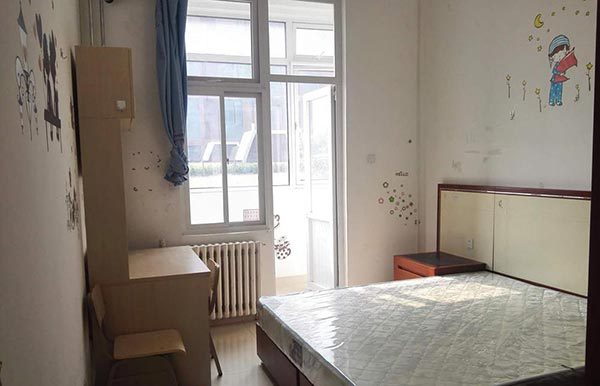
A flurry of online discussion ensued after the posting last week of a long-standing offer of special dormitories for married students at Nankai University in Tianjin.
The post was forwarded and commented on by netizens, most of whom supported the university. Some even thought the policy might encourage students to get married while in school.
The dorms for married students are only available to couples if both partners are registered for school.
Students need to provide their campus ID and marriage certificates to apply for the dorms, according to a message posted on the university’s social media account on Thursday.
There are a total of 43 dorms for couples, divided between the university’s two campuses, Balitai and Jinnan, said Sun Yue, a teacher in the Life Guide Center of the student affairs department.
Sun said the rooms, about 20 square meters each, are equipped with a double bed, wardrobe, a desk and shelf for two, a private bathroom and other basic furniture.
She said the annual fee for each room is 2,400 yuan ($360), and it’s up to the couple to decide whether or not to rent an air conditioner.
“Five more couples have checked in for this semester, and currently there are eighteen married student couples living in the dorms,” Sun said.
She added: “The dorms for couples have been available at NKU for about seven to eight years. There are not many who apply for it, so we do not have a separate dorm building for couples.”
Sun said the university provides special dorms for couples as a courtesy, and will continue doing so as long as there is enough space.
“Some married students waste a lot of money renting an apartment off campus so they can live together,” Sun said. “The dorms for couples can relieve the economic pressure and help them focus on their studies.”
“Currently, all the couples who have applied for the dorms are master’s degree or doctoral students. Getting married is an individual behavior, and the university will not interfere in their personal decisions,” she added.
Fan Xueni, 27, a second-year master’s degree student, observed: “In general, for master’s students, four people share a dorm, and two doctoral students share a dorm with affordable prices.”
Fan’s boyfriend is studying in Beijing, and they must rent a hotel room anytime they meet in Tianjin.
“I think few students meet the conditions. I don’t see many married students around me, let alone both attending the same university. Most of my friends are in long-distance relationships, or dating people at their university – not married,” Fan said.
In September 2005, the Ministry of Education scrapped a rule saying that undergraduates’ freedom to marry would no longer be restricted under China’s Marriage Law and marriage registration regulations.
The new rule meant that undergraduate-age couples – men 22 and above; women 20 and above – could get married as they wished, like other Chinese citizens.
Cai Xiao, 26, now a doctoral candidate in cognitive neuroscience at Renmin University of China, was one of the later beneficiaries:
“I married my husband in 2014 when I was a senior in college,” she said.


